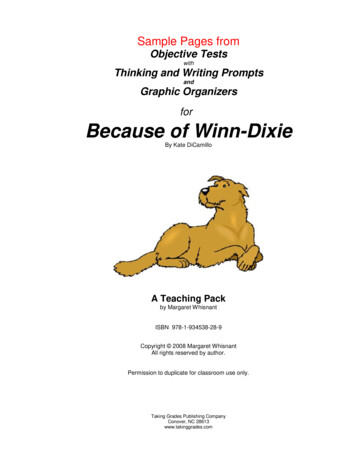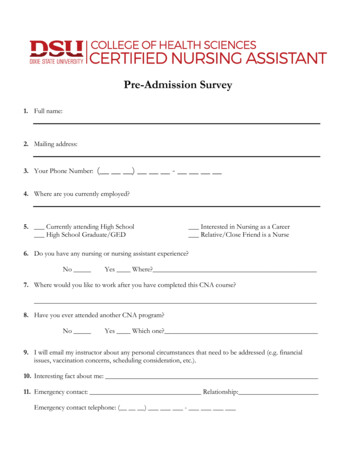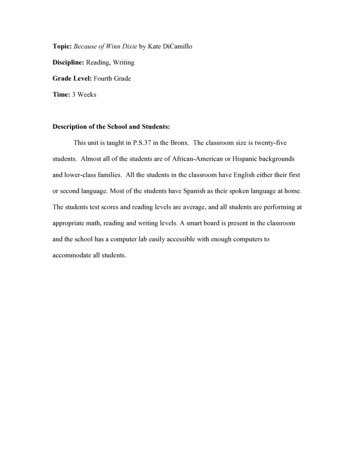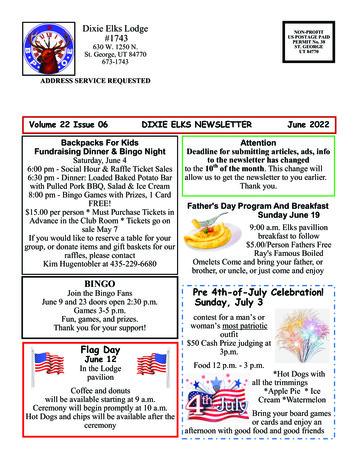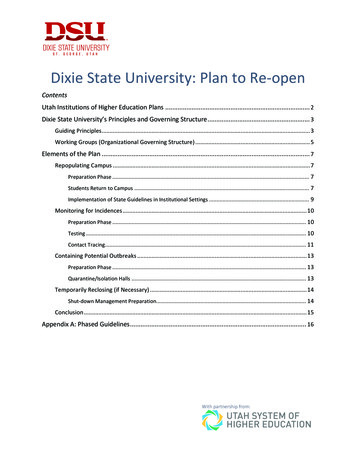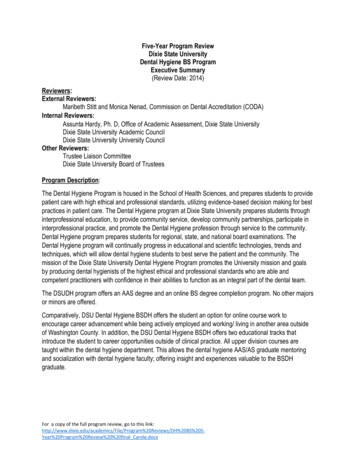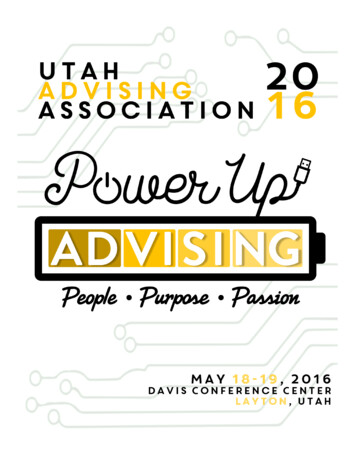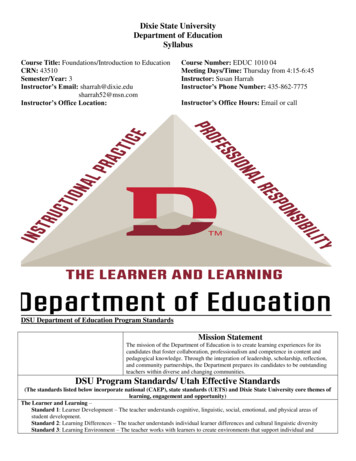
Transcription
Dixie State UniversityDepartment of EducationSyllabusCourse Title: Foundations/Introduction to EducationCRN: 43510Semester/Year: 3Instructor’s Email: sharrah@dixie.edusharrah52@msn.comInstructor’s Office Location:Course Number: EDUC 1010 04Meeting Days/Time: Thursday from 4:15-6:45Instructor: Susan HarrahInstructor’s Phone Number: 435-862-7775Instructor’s Office Hours: Email or callDSU Department of Education Program StandardsMission StatementThe mission of the Department of Education is to create learning experiences for itscandidates that foster collaboration, professionalism and competence in content andpedagogical knowledge. Through the integration of leadership, scholarship, reflection,and community partnerships, the Department prepares its candidates to be outstandingteachers within diverse and changing communities.DSU Program Standards/ Utah Effective Standards(The standards listed below incorporate national (CAEP), state standards (UETS) and Dixie State University core themes oflearning, engagement and opportunity)The Learner and Learning –Standard 1: Learner Development – The teacher understands cognitive, linguistic, social, emotional, and physical areas ofstudent development.Standard 2: Learning Differences – The teacher understands individual learner differences and cultural linguistic diversityStandard 3: Learning Environment – The teacher works with learners to create environments that support individual and
collaborative learning, positive social interactions, active engagement in learning, and self-motivationInstructional Practice –Standard 4: Content Knowledge – The teacher understands the central concepts, tools of inquiry, and structures of the discipline.Standard 5: Assessment – The teacher uses multiple methods of assessment to engage learners in their own growth, monitorlearner progress, guide planning and instruction, and determine whether the outcomes described in content standards have beenmet.Standard 6: Instructional Planning – The teacher plans instruction to support students in meeting rigorous learning goals bydrawing upon knowledge of content areas, Utah Core Standards, instructional best practices, and the community context.Standard 7: Instructional Strategies – The teacher uses various instructional strategies to ensure that all learners develop a deepunderstanding of content areas and their connections and build skills to apply and extend knowledge in meaningful ways.Professional Responsibility –Standard 8: Reflection and Continuous Growth – The teacher is a reflective practitioner who uses evidence to continuallyevaluate and adapt practice to meet the needs of each learner.Standard 9: Leadership and Collaboration – The teacher is a leader who engages collaboratively with learners, families,colleagues, and community members to build a shared vision and supportive professional culture focused on student growth andsuccess.Standard 10: Professional and Ethical Behavior – The teacher demonstrates the highest standard of legal, moral, and ethicalconduct as specified in Utah State Board Rule R277-515Program Application Deadlines:Elementary Education ProgramSET ProgramSpring 2016: September 30, 2015 Advisor: Dr. Terry YoungFall 2016: January 29, 2016tyoung@dixie.eduNIB 101Fall 2016: January 29, 2016Advisor: Woody Odilodil@dixie.eduNIB 139Course Description: This course is for students pursuing a degree in the teaching profession. The courseprovides an overview of vocational aspects of a teaching career including: certification requirements,foundations of education, current and historical issues in education, and an overview of current trends inmethodology. This class provides students with an opportunity to assess oneself as a prospective teacher.Various teaching methods are used including lecture, cooperative learning, inquiry methods, and directinstruction. Students are required to do two full observation days in local K-12 school settings. This class is aprerequisite for admittance to the Dixie State University Education programs.Course pre-requisites and/or co-requisites: N/ALab or course fees: N/ARequired Textbook(s) and Materials: Kauchak, Donald, Eggen, Paul (2011), Introduction to Teaching,Becoming a Professional (4th ed.), NJ: Pearsone-textbook availableCourse Objectives and Outcomes: By the end of this course, students will:introduced to the professional aspects of teaching as a career.introduced to the historical, philosophical and political issues influencing education.and school programs and practices.
Grading:Grading:A 95-100B 84-86C 74-76D 64-66A- 90-94B- 80-83C- 70-73D- 60-63B 87-89C 77-79D 65-69F Below 60You must maintain a cumulative GPA of 3.0 to enter the Teacher Education Program at DSU. Allcourse grades must be C or a better grade. You must retake the course if your grade is below a C.It is the responsibility of the student to verify that all grades have been correctly placed intoCANVAS by the instructor. Monitor CANVAS weekly and notify the instructor immediately, ifyou are missing a grade or have received an incorrect grade.Save quick writes and assignments to verify your claims. Grades will not be changed withoutproof of instructor oversight or error, and no grade can be changed once final grades have beenentered.Course Grading Point ValuesAttendance/Quizzes- Group work each class- 150 points total- 5 points eachLetter of Introduction- 20 pointsObservation Reports- 40 points- 20 points for each assignmentPhilosophy- 50 pointsINTASC Principle Assignments- 100 points- 25 points for each assignmentMid Term Exam- 50 pointsFinal Exam- 100 points- Must be done on the day of the scheduled time for DSUImportant dates to remember for Fall 2015:Mon, Aug 17Tuition and Fees Due, Courses Dropped for Non-PaymentMon, Aug 24Classes beginThurs, Aug 27Last day for waitlistFri, Aug 28Last day to add classes without signatureTue, Sep 1 50 Late registration/payment feeWed, Sep 2Drop/Audit fee begins ( 10 per class)Wed, Sep 2Residency Application deadlineFri, Sep 4End of 100% refund periodMon, Sep 6Labor Day (no classes)Tues, Sep 8Beginning of 50% refund period
Mon, Sep 14Last day for refundMon, Sep 14Pell Grant CensusMon, Sep 14Last day to drop without a “W” gradeFri, Sep 18Last day to add/audit classesThurs, Oct 1Fall 2015 Associates Degree Graduation Application deadlineMon, Oct 5Block classes beginWed, Oct 14Midterm grades dueThurs & Fri, Oct 15-16Fall break (no classes)Mon, Oct 19Last day to drop individual classesMon, Oct 26Spring and Summer 2015 class schedules available onlineMon, Nov 2Spring 2015 Bachelor’s Degree Graduation Application deadlineFri, Nov 13Last day for complete withdrawalOct 16-19Spring Registration OpensWed-Fri, Nov 25-27Thanksgiving break (no classes)Fri, Dec 11Last day of classesMon-Fri, Dec 14-18Final examsMarch 7-11, 2016New Spring Break datesDate & Time of Final Exam:Academic Honesty: As stated in the DSC Student Handbook; “Academic dishonesty in any form will not betolerated at Dixie State College (Academic Discipline Policy, 3.34)” including cheating, and plagiarism. Theseacts of academic dishonesty are strictly prohibited. See also Student Academic Conduct Policy for Academicdishonesty / Academic integrity policyDisability Statement: If you suspect or are aware that you have a disability that may affect your success in thecourse you are strongly encouraged to contact the Disability Resource Center (DRC) located at the North PlazaBuilding. The disability will be evaluated and eligible students will receive assistance in obtaining reasonableaccommodations. Phone # 435-652-7516Title IX: The Dixie State University's Sexual Harassment and Sexual Misconduct policies are compliant withFederal laws prohibiting discrimination requires that faculty, student employees and staff members report anyincidents of sex discrimination, including sexual harassment, sexual misconduct, stalking on the basis of sex,dating/intimate partner violence or sexual exploitation and/or related experiences or incidents.Important links:Disability Resource Center – www.dixie.edu/drcenterIT Help Desk – www.dixie.edu/helpdeskLibrary – www.library.dixie.eduTesting Center – www.dixie.edu/testingTutoring Center – www.dixie.edu/tutoringWriting Center – www.dixiewritingcenter.comDmail: You are required to frequently check your Dmail account. Important class and university informationwill be sent to your Dmail account, including DSU bills, financial aid/scholarship notices, notices of cancelledclasses, reminders of important dates and deadlines, and other information critical to your success at DSU and
in your courses. To access your Dmail account, visit go.dixie.edu/dmail. If you do not know your Dmailusername or you have forgotten your PIN, visit: go.dixie.edu/mydixie and click the Forgot Pin button.Instructure Canvas: If anyone has forgotten their login information or your course is not displaying, pleasecontact the Helpdesk and/or the website http://www.dixie.edu/helpdesk/. The Helpdesk is located in the SmithComputer Centers main computer lab. Online tutorials for CANVAS can be found athttp://guides.instructure.com/.Disruptive Behavior and classroom expectations: “In order to ensure that the highest standards ofprofessional and ethical conduct are promoted and supported at the College, students must adhere to theprescribed professional and ethical standards of the profession or discipline for which the student is preparing,as adopted or recognized as authoritative by the relevant academic program. A student who engages inprofessional misconduct may be subject to academic sanctions including but not limited to a grade reduction,failing grade, probation, suspension, or dismissal from the program or the College, denial or revocation of astudent’s degree or certificate, or comparable professional credentialing sanctions.” Toward this end, teachersmay dismiss and remove disruptive students from individual class activities. If a student’s behavior continuesto disrupt class activities, the teacher may dismiss and remove disruptive students from their courses.”Policy for Absences Related to College Functions: Instructor policy on late assignments, missed exams/quizzes, and unexcused absences:Attendance and Participation: The design of this course makes it necessary for students to fully participate inclassroom discussions, panel presentations, guest presentations and cooperative structures. Thus, attendanceand participation are required for this course. Appropriate documentation will be required for missing class.Assignments are due on specific dates. Assignments should reflect high levels of thinking, analysis, andapplication. Please use a word processing program for all assignments.Make-up Work: Students that miss class for legitimate reasons may make up missed assignments. Thefollowing are considered legitimate reasons for missing class: DSU sponsored event (must provide writtendocumentation), illness (must provide written documentation from a valid physician), death of an immediatefamily member (must provide written documentation). If the professor excuses an absence, the student hasuntil the beginning of the next class to turn in the assignment. Quizzes cannot be made up.Re-Do’s: My goal is for each of you to learn as much as possible and to achieve proficiency of the coursecontent. Therefore, I allow re-do’s of some assignments (does not apply to tests or quizzes). Re-do’s must becompleted within one week after the graded assignment is returned.Assignment RequirementsLetter or Introduction- The purpose of this letter is to introduce yourself to the teachers that you will visit onour observation days. Your letter will state your objective and serve as an overview of your background, sothat the teacher and students will have a chance to know your background when you visit. It is important tohighlight any experiences working with children. You will write one letter but will need to have it for bothexperiences (elementary and secondary). This will need to be at least a page in length.INTASC Principles- These assignments are connected to the standards in teacher education with the purposeto increase the quality of the teacher preparation program. Each assignment needs to address all of thecomponents and show evidence that you have intertwined your personal experience with the research to help
assure relevance. You must attach your competed self-scoring sheet with each INTASC submission. Eachpaper will need to be at least a page in length.Observation Reports- For each required Observation Day, you will submit a report that contains yourassessment on the following components: physical setting, classroom management, instruction, and yourreflection on the overall effect of this experience for you. You must also attach the teacher’s evaluation ofyour visitation for observation credit. Note: You must participate in both observations. Each report will needto be at least a page in length.Philosophy of Education- You should use this assignment as a work in progress. AS you continue youreducation and your teaching experiences, you may find that your beliefs change. Read the educationphilosophies in Chapter Seven: Perennialism, Essentialism, Progressivism, and Postmodernism/SocialReconstructionism. Think about how these align with your personal belief system and then construct yourphilosophy of education to include the following components: Purpose of Education, Curriculum, InstructionalStrategies and Assessment. The philosophy will need to be at least a page in length.Assignment FormatINTASC PrincipleName:EDUC 1010INTASC Principle #Assignment*Attach self scoring sheet (when required) to the back of the completed assignmentLetter of IntroductionGreeting:Objective:Your Background:Experience Working With Children:Closing:Observation ReportName:EDUC 1010Name of School- Grade Level or SubjectObservation Report- Physical Setting/Classroom r’s Evaluation of you- stapled to your reportPhilosophy of EducationMy Philosophy of EducationName:Purpose of Education:Curriculum:Instructional Strategies:Assessment:Self Regulated Tracking Record
Quiz/Group work- 10 points per classINTASC Principles Completion PointsAssignment #1 Assignment #2 Assignment #3 Assignment#4Letter of Introduction Completion Points-Observation Completion Points- 1. 2.Philosophy of Education Completion Points-Mid Term Points-Final Exam Points-INTASC Principle Assignments – Interstate New Teacher Assessment and Support Consortium*Choose one Principle and only one for each due dateINTASC 1Principle 2Due: Oct. 1Begin thinking about your role in developing responsibility in your students. Consider the age anddevelopmental levels of the students you will be teaching. Think about the different ways teachers can developresponsibility in students at this stage of development. Consider both instructional strategies and managementstrategies. What specific things would you do to develop responsibility in your students? How would thesesuggestions change for different groups of students who were either older or younger?INTASC 1Principle 3Due: Oct. 1Although you are not yet prepared to deliver instruction or create instructional opportunities, you are now atleast aware of some of the ways in which students are the same and some of the ways in which they aredifferent- such as Learning Styles, Physical and Mental challenges, Socioeconomic Status, culture andlanguage. Identify a grade level that you plan to teach and explain how you would find out about the differenceamong the students in your classroom.INTASC 1Principle 6Due: Oct. 1What 3 techniques (beyond those that are district mandated) do you anticipate using regularly to involvefamilies in the life of your school?INTASC 2Principle 7Due: Oct. 22The community in which you will be teaching believes that character education should be taught in the schools.Considering the subject and/or grade level in which you plan to teach, how would you plan to include charactereducation in your instruction?INTASC 2
Principle 5Due: Oct. 22If you walked into a classroom at a specific grade level , what behaviors indicate the existence of positive socialinteraction?INTASC 2Principle 10Due: Oct. 22If an ethical dilemma arises, what should a relatively new teacher do? Should the teacher see advice? Underwhat circumstances might a teacher develop decisions based on personal ethics without consulting anotherteacher or an administrator?INTASC 3Principle 8Due: Nov. 12Go to the assessment section of the Washington County School District’s website:http://assessment.washk12.org/ and write a brief summary of the following assessments- SAGE, DWA,DIBELS- You may need additional resources for information.INTASC 3Principle 9Due: Nov. 12From Table 2.4 on page 442 of your text, select a teacher’s professional organization that interests you. Usingthe website provided, explore the different services described there. Find out what it cost to join and what themembership benefits are. Summarize your findings. (Note: you did not research adequately if you say there areno membership fees for this organization. Therefore, you have not completed the assignment and it willnegatively impact your grade)INTASC 4Principle 1Due: Nov. 26Consider INTASC Principle 1. Determine which branch of philosophy you think the standard addresses mostreadily and explain why.INTASC 4Principle 4Due: Nov. 26Until the 1990’s there was little or no mention of technology in standards. Why are guidelines now necessaryfor technology use in the schools? Why is it important for teachers to know about and use many differentresources and tools in the classroom?
Course Reading Assignments/Assessments/Due Dates Subject to change when announcedDateAug. 27Sept. 3Sept. 10Sept. 17Sept. 23Sept. 24Oct. 1Oct. 8Oct. 15Oct. 21What We Will DoGet to know you activityDiscuss syllabusClass requirementsWhat is it like to be a teacher?The teaching professionDiversityReform in Teacher Ed.Changes in AmericanFamiliesChanges in our StudentsThe influence ofsocioeconomic factors on thestudentsCultural DiversityLanguage DiversityGenderLearners with ExceptionalitiesSchool Observation 8:303:30 @ HeritageElementary SchoolSchool Observation 8:303:30@ Heritage ElementaryThe Colonial PeriodThe Early National PeriodThe Common SchoolMovementThe Evolution of theAmerican High SchoolSearching for EqualityThe Modern EraPhilosophy and Philosophy ofEducationBranches of PhilosophyPhilosophies of EducationDeveloping Your Philosophyof EducationMidtermHow do schools functionSchool levelsFinding a Good SchoolFall Break!School Observation 7:302:00 @ Lava RidgeIntermediateAssignments DueChapter 1 – Do I Want To Be aTeacher?Chapter 2- Changing in AmericanSociety: Their Influences on Today’sStudentsLetter of IntroductionChapter 3- Student Diversity- Culture,Language, Gender, and ExceptionalitiesChapter 4- Education in the UnitedStates: Its Historical Roots*Short class (5 p.m.) due toobservationsChapter 5- Educational Philosophy andYour TeachingINTASC 1*First Observation Report DueChapter 6- Choosing a School
Oct. 22Oct. 29Nov. 5Nov. 12Nov. 19Nov. 26Dec. 3Dec. 10Dec. 17School Observation 7:302:00 @ Lava RidgeIntermediateGovernanceSchool FinanceEmerging Issues in SchoolGovernance and FinanceLaw and EthicsThe U.S. Legal SystemTeachers’ Rights andResponsibilitiesReligion and the LawStudents’ Rights andResponsibilitiesChapter 7- Governance and Finance:Regulating and Funding SchoolsINTASC 2*Short class (5p.m.) due toobservationsWhat’s curriculumComponents of curriculumForces that influence thecurriculumControversial issues in thecurriculumProductive learningenvironmentInvolving parentsIntervening when misbehavioroccursStudent motivation andeffective teachingPlanningImplementing instructionInstructional strategiesThanksgiving Break!Chapter 9- The School Curriculum inan Era of Standards*Second Observation ReportUnderstanding ReformReform- Focus on the teacherReform- Focus on thecurriculumReform- Focus on the schoolEntering the ProfessionFinal ReviewChapter 12- Educational Reform andYouINTASC 4FINAL EXAM5:00-7:00 in room #150Chapter 8- School Law: Ethical andLegal Influences on TeachingChapter 10- Classroom Management:Creating Productive LearningEnvironmentsINTASC 3Chapter 11- Becoming an EffectiveTeacherChapter 13- Developing as aProfessionalPhilosophy of Education
(The standards listed below incorporate national (CAEP), state standards (UETS) and Dixie State University core themes of learning, engagement and opportunity) The Learner and Learning - Standard 1: Learner Development - The teacher understands cognitive, linguistic, social, emotional, and physical areas of student development.

